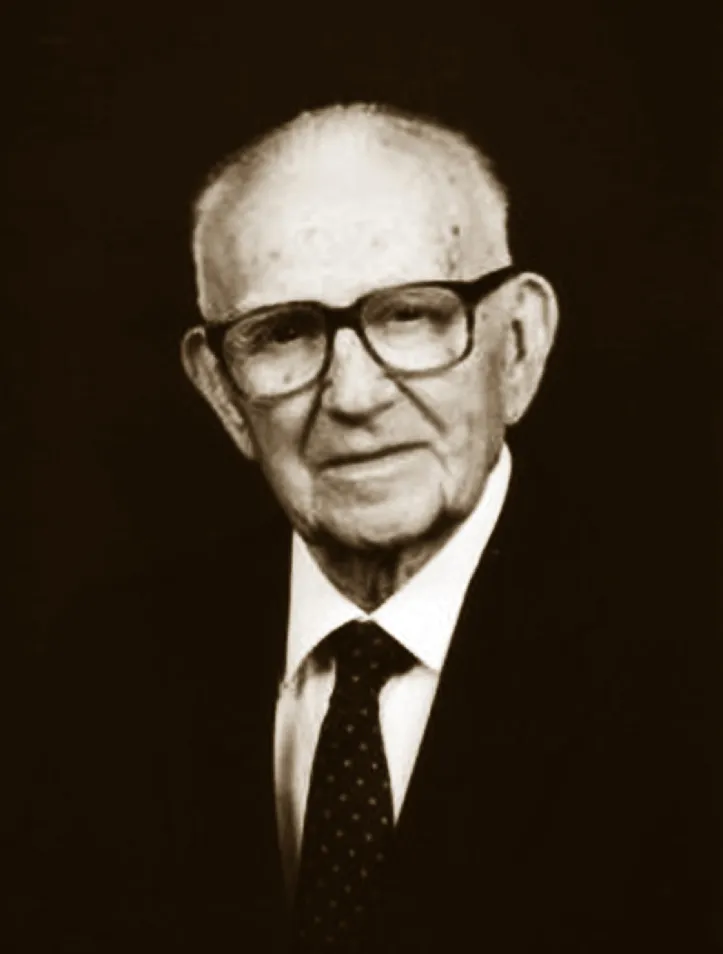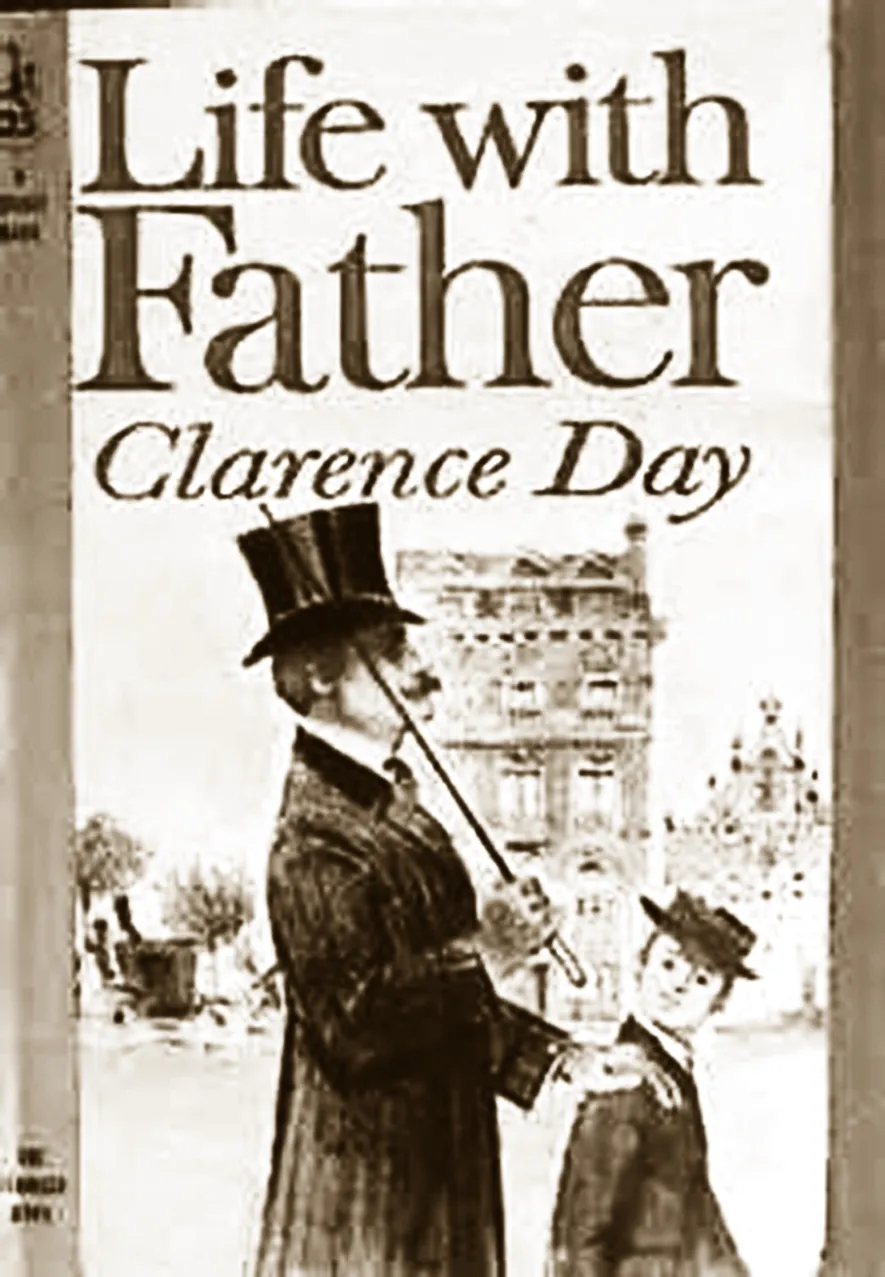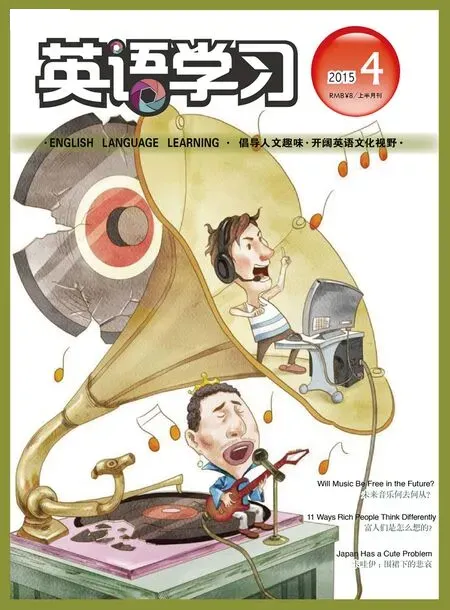Father Wakes up the Village
Clarence Day
One of the most disgraceful features of life in the country, Father often declared, was the general inef ficiency and slackness(懈怠)of small village tradesmen. He said he had originally supposed that such men were interested in business, and that that was why they had opened their shops and sunk capital in them, but no, they never used them for anything but gossip and sleep. They took no interest in civilized ways. Hadn’t heard of them, probably. He said that of course if he were camping out on veldt(非洲大草原)or the tundra(冻原,冻土地带), he would expect few conveniences in the neighbourhood and would do his best to forego(放弃) them, but why should he be confronted with the wilds twenty miles from New York?
Usually, when Father talked this way, he was thinking of ice. He strongly objected to spending even one day of his life without a glass of cold water beside his plate at every meal. There was never any dif ficulty about this in our home in the city. A great silver ice-water pitcher(大水罐)stood on the side-board all day, and when Father was home its outer surface was frosted with cold. When he had gone to the of fice, the ice was allowed to melt sometimes, and the water got warmish, but never in the evening, or on Sundays,when Father might want some. He said he liked water, he told us it was one of Nature’s best gifts, but he said that like all her gifts it was un fit for human consumption unless served in a suitable manner. And the only right way to serve water was icy cold.
It was still more important that each kind of wine should be served at whatever the right temperature was for it. And kept at it, too. No civilized man would take dinner without wine, Father said, and no man who knew the first thing about it would keep his wine in hot cellars(酒窖).Mother thought this was a mere whim(奇想,怪念头)of Father’s. She said he was fussy(挑剔的). How about people who lived in apartments, she asked him, who didn’t have cellars? Father replied that civilized persons didn’t live in apartments.
One of the first summers that Father ever spent in the country, he rented a furnished house in Irvington on the Hudson, not far from New York. It had a garden, a stable(马厩), and one or two acres of woods, and Father arranged to camp out there with many misgivings(担忧). He took a train for New York every morning at eightten, after breakfast, and he got back between five and six,bringing anything special we might need along with him,such as a basket of peaches from the city, or a fresh package of his own private coffee.
Things went well until one day in August the ice-man didn’t come. It was hot, he and his horses were tired, and he hated to come to us anyhow because the house we had rented was perched up(高处于)on top of a hill. He said afterward that on this particular day he had not liked the idea of making his horses drag the big ice-wagon(四轮马车) up that sharp and steep road to sell fifty cents’ worth of ice. Besides, all his ice was gone anyhow—the heat had melted it on him. He had four or five other good reasons. So he didn’t come.
Father was in town. The rest of us waited in astonishment, wondering what could be the matter. We were so used to the regularity and punctilio(细节)of life in the city that it seemed unbelievable to us that the ice-man would fail to appear. We discussed it at lunch. Mother said that the minute he arrived she would have to give him a talking to. After lunch had been over an hour and he still hadn’t come, she got so worried about what Father would say that she decided to send to the village.

克劳伦斯·戴伊
本篇选自美国作家克劳伦斯·戴伊(1874-1935)的《与父亲一起生活》(Life with Father),该书写于1935年,是一部诙谐幽默的自传体小说。父亲对周围的一切事物都有着过分的严苛,但却也因此显得可爱而滑稽。该部小说通过描写“我”和家人的生活,刻画出19世纪末美国中上层阶级的家庭生活状态,是作者最具代表性的作品之一。
克莱伦斯一家一到夏天就离开纽约市区去乡下度假,但是老克莱伦斯对乡下的货物供给很不满意,认为乡下人不会做生意。父亲喝酒离不开冰,这件事在城市里很好解决,但在乡下,冰的供应就不能保证了。父亲认为文明人吃晚饭必须喝酒,而且酒必须保持某个温度,所以家里必须有冰块。然而有一个烈日炎炎的夏天冰块迟迟没有送来。没有冰,父亲就不能喝酒,不喝酒,他就无法吃晚饭。那么父亲是怎样解决冰块危机的呢?
There was no telephone, of course. There were no motors. She would have liked to spare(宽厚地对待)the horse if she could, for he had been worked hard that week.But as this was a crisis, she sent for Morgan, the coachman,and told him to bring up the dog-cart(双轮马车).
The big English dog-cart arrived. Two of us boys and the coachman drove off. The sun beat down on our heads. Where the heavy harness(马具)was rubbing on Brownie’s coat, he broke out(突发,突然出现)into a thick,whitish(发白的)lather(泡沫). Morgan was sullen(不高兴的). When we boys were along he couldn’t take off his stiff black high hat or unbutton his thick, padded(填装垫料的)coat. Worse still, from his point of view, he couldn’t stop at a bar for a drink. That was why Mother had sent us along with him, of course, and he knew it.
We arrived at the little town after a while and I went into the Coal & Ice Of fice. A wiry-looking(瘦长结实的)old clerk was dozing in a corner, his chair tilted back(向后倾斜)and his chin resting on his dingy(肮脏的)shirt-front. I woke this clerk up. I told him about the crisis at our house.
He listened unwillingly, and when I had finished he said it was a very hot day.
I waited. He spat(吐口水). He said he didn’t see what he could do, because the ice-house was locked.
I explained earnestly that this was the Day family and that something must be done right away.
He hunted around his desk a few minutes, found his chewing tobacco, and said, “Well, sonny, I’ll see what I can do about it.”
I thanked him very much, as that seemed to me to settle the matter. I went back to the dog-cart. Brownie’s check-rein(缰绳)had been unhooked, and he stood with his head hanging down. He looked sloppy(邋遢的). It wouldn’t have been so bad with a buggy(马车), but a slumpy horse in a dog-cart can look pretty awful. Also, Morgan was gone. He reappeared soon,coming out of a side door down the street, buttoning up his coat, but with his hat tilted back. He looked worse than the horse.
We checked up the weary animal’s head again and drove slowly home. A hot little breeze in our rear moved our dust along with us. At the foot of the hill, we boys got out, to spare Brownie our extra weight. We unhooked his check-rein again. He dragged the heavy cart up.
Mother was sitting out on the piazza(走廊). I said the ice would come soon now. We waited.
It was a long afternoon.
At five o’clock, Brownie was hitched up(套上了缰绳)again. The coach-man and I drove back to the village. We had to meet Father’s train. We also had to break the bad news to him that he would have no ice-water for dinner, and that there didn’t seem to be any way to chill his Rhine wine.
The village was as sleepy as ever, but when Father arrived and learned what the situation was, he said it would have to wake up. He told me that he had had a long, trying day at the of fice, the city was hotter than the Desert of Sahara, and he was completely worn out, but that if any ice-man imagined for a moment he could behave in that manner, he, Father,would take his damned head off. He strode into the Coal & Ice Of fice.
When he came out, he had the clerk with him, and the clerk had put on his hat and was vainly trying to calm Father down. He was promising that he himself would come with the ice-wagon if the driver had left, and deliver all the ice we could use, and he’d be there inside an hour.
Father said, “Inside of an hour be hanged, you’ll have to come quicker than that.”
The clerk got rebellious. He pointed out that he’d have to go to the stables and hitch up the horses himself, and then get someone to help him hoist(举起)a block of ice out of the ice-house. He said it was most time for his supper and he wasn’t used to such work. He was only doing it as a favor to Father. He was just being neighborly(友好的).
Father said he’d have to be neighborly in a hurry, because he wouldn’t stand it, and he didn’t know what the devil the ice company meant by such actions.
The clerk said it wasn’t his fault, was it? It was the driver’s.
This was poor tactics(策略), of course, because it wound Father up(使父亲大为恼火)again. He wasn’t interested in whose fault it was, he said. It was everybody’s.What he wanted was ice and plenty of it, and he wanted it in time for his dinner. A small crowd which had collected by this time listened admiringly as Father shook his finger at the clerk and said he dined at six-thirty.

The clerk went loping off(迈着大步)toward the stables to hitch up the big horses. Father waited till he’d turned the corner.
Followed by the crowd, Father marched to the butcher’s.After nearly a quarter of an hour, the butcher and his assistant came out, unwillingly carrying what seemed to be a cof fin, wrapped in a black mackintosh(防水胶布). It was a huge cake of ice.
Father got in, in front, sat on the box seat beside me,and took up the reins(缰绳). We drove off. The coach was on the rear seat, sitting back-to-back to us, keeping the ice from sliding out with the calves(小腿)of his legs. Father began proceedings(行动)by demanding to see all the man’s ice-boxes. There were only a few. Father selected the largest he had. Then, when the sale seemed arranged, and when the proprietor(经营者)was smiling broadly with pleasure at this sudden windfall(意外之财), Father said he was buying that refrigerator only on two conditions.
The first was that it had to be delivered at his home before dinner. Yes, now. Right away. The shopkeeper explained over and over that this was impossible, but that he’d have it up the next morning, sure. Father said no, he didn’t want it the next morning, he had to have it at once.He added that he dined at six-thirty, and that there was no time to waste.
The shopkeeper gave in.
The second condition, which was then put to him firmly, was staggering(令人惊愕的). Father announced that that ice-box must be delivered to him full of ice.
The man said he was not in the ice business.Father said, “Very well then. I don’t want it.”
The man said obstinately(固执地)that it was an excellent ice-box. Father made a short speech. It was the one that we had heard so often at home about the slackness of village tradesmen, and he put such strong emotion and scorn(轻蔑)in it that his voice rang through the shop. He closed it by saying, “An ice-box is of no use to a man without ice, and if you haven’t the enterprise, the gumption(进取心), to sell your damned goods to a customer who wants them delivered in condition to use,you had better shut up your shop and be done with it. Not in the ice business, hey? You aren’t in business at all!” He strode out.
The dealer came to the door just as Father was getting into the dog-cart, and called out anxiously, “All right, Mr.Day. I’ll get the refrigerator filled for you and send it up right away.”
Father drove quickly home. A thunderstorm seemed to be brewing(酝酿)and this had waked Brownie up, or else Father was putting some of his own supply of energy into him. The poor old boy probably needed it as again he climbed the steep hill. I got out at the foot, and as I walked along behind I saw that Morgan was looking kind of desperate trying to sit in the correct position with his arms folded while he held in the ice with his legs. The big cake(指那块大冰)was continually slipping and sliding around under the seat and doing its best to plunge out(往外跳). It had bumped against his calves all the way home. They must have got good and cold.
When the dog-cart drew up at our door, Father remained seated a moment while Morgan, the waitress,and I pulled and pushed at the ice. The mackintosh had come off it by this time. We dumped it out the grass. A little later, after Morgan had unharnessed and hurriedly rubbed down(用力擦遍)the horse, he ran back to help us boys break the cake up, push the chunks around to the back door, and cram them into the ice-box while Father was dressing for dinner.
Mother had calmed down by this time. The Rhine wine was cooling. “Don’t get it too cold,” Father called.
Then the ice-man arrived.
The old clerk was with him, like a warden(狱卒)in charge of a prisoner. Mother stepped out to meet them,and at once gave the ice-man the scolding that had been waiting for him all day.
The clerk asked how much ice we wanted. Mother said we didn’t want any now. Mr. Day had brought home some, and we had no room for more in the ice-box.
The ice-man looked at the clerk. The clerk tried to speak, but no words came.
Father put his head out of the window. “Take a hundred pounds, Vinnie,” he said. “There’s another box coming.”
A hundred-pound block was brought into the house and heaved(投掷)into the washtub. The waitress put the mackintosh over it. The ice-wagon left.
Just as we all sat down to dinner, the new ice-box arrived, full.
Mother was provoked(被激怒). She said “Really,Clare!” crossly. “Now what am I to do with that piece that’s waiting out in the washtub?”
Father chuckled.
She told him he didn’t know the first thing about keeping house, and went out to the laundry with the waitress to tackle the problem. The thunderstorm broke and crashed. We boys ran around shutting the windows upstairs.
Father’s soul was at peace. He dined well, and he had his coffee and cognac(法国白兰地)served to him on the piazza(阳台). The storm was over by then. Father snuffed(嗅)a deep breath of the sweetsmelling air and smoked his evening cigar.
“Clarence,” he said, “King Solomon1. 所罗门王是犹太民族历史上最伟大的君王,也是世界上最传奇的君王之一。据《圣经》记载,所罗门在20岁登基后在梦中向上帝祈求智慧,上帝不仅赐给他无比的智慧,还赐给他无尽的荣耀,财富以及美德。had the right idea about these things. ‘whatsoever thy hand findeth to do,’ Solomon said, ‘do thy damnedest.’”(“克莱伦斯,”父亲说,“ 所罗门国王说得对,‘只要是值得做的事,就要尽最大的力做好。’”)
Mother called me inside. “Whose mackintosh is that?” she asked anxiously. “Katie’s torn a hole in the back.”
I heard Father saying contentedly on the piazza, “I like plenty of ice.”

